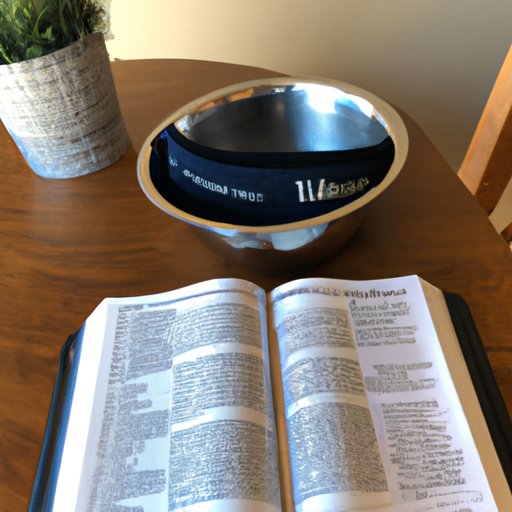Introduction
For many Christians, reading the Bible is an essential part of their spiritual journey. It’s not only a source of comfort and guidance, but also a way to connect with God on a deeper level. Unfortunately, for some, it can be difficult to know exactly how to begin.
This article is designed to provide helpful tips and resources to those who are just getting started with Bible reading. No matter what your level of faith or familiarity with Scripture, these tips will help you learn how to read the Bible in a meaningful way that can bring you closer to God.
Before we get started, it’s important to note that this article is written for those who have little to no experience with Bible reading. If you are looking for more advanced advice, please consult with your pastor or other spiritual leader.

Setting Aside Time Each Day to Read the Bible
The first step in learning how to read the Bible is to set aside time each day to do so. This doesn’t mean you need to devote hours each day to Bible study; even just a few minutes each day can make a difference. The key is consistency.
When deciding when and where to read, it may be helpful to consider what works best for you. Do you prefer to read in the morning, or would the evening work better? Do you like to read in the quiet of your home, or would you prefer to read at church? Once you have identified when and where you will read, try to stick with it as much as possible.
It can also be helpful to make a plan for consistent Bible reading. For example, if you decide to read for 15 minutes each day, make sure you are reading the same amount each day. One way to do this is to choose a book of the Bible or a specific chapter and read a certain number of verses each day. Having a plan and sticking to it will help ensure that you are consistently reading the Bible each day.
Choosing a Translation
Once you have decided when and where you will read, the next step is to choose a translation. There are many different translations of the Bible available, so it’s important to select one that is easy to understand. It’s also important to remember that different translations can interpret verses differently, so it’s best to select one that is widely accepted.
Some popular translations include the King James Version (KJV), the New International Version (NIV), the English Standard Version (ESV), and the New Living Translation (NLT). You may want to try out a few different translations to see which one works best for you.
Starting with the Gospels
The Gospels are a great place to start when reading the Bible. These books—Matthew, Mark, Luke, and John—tell the story of Jesus’ life, death, and resurrection. They are filled with stories that are relevant to our lives today and offer insight into Jesus’ teachings and ministry.
If you are just starting out, it may be helpful to begin with one of the Gospels. Many people find it beneficial to read through the Gospels in chronological order, starting with Matthew. However, you may find it easier to start with whichever Gospel speaks to you the most.
Reading in Short Bursts
Reading the Bible can be overwhelming, especially if you are just starting out. One way to make it more manageable is to read in short bursts. This means breaking down the text into smaller sections and focusing on one section at a time. This will help you better understand the text and make it easier to digest.
To make the most of your reading sessions, it’s important to focus on what you are reading. Take notes, ask questions, and look up words you don’t understand. It’s also helpful to read with an open heart and mind, allowing the Holy Spirit to guide you as you read.

Making Use of Helpful Study Guides and Devotionals
Another helpful tool for Bible reading is to use study guides and devotionals. These resources can provide additional insight into the text and can help you gain a better understanding of the Bible. Popular study guides and devotionals include The Bible Project, The Bible Reading Plan, and The Daily Bible.
These resources are not meant to replace the Bible, but rather to supplement it. It’s important to remember that the ultimate source of truth is the Bible itself, not any secondary sources.
Asking Your Pastor or Other Spiritual Leader for Advice
If you are still feeling overwhelmed by Bible reading, it can be helpful to seek advice from a spiritual leader. Pastors and other spiritual leaders can provide valuable insight and guidance as you embark on your journey of Bible reading. They can answer any questions you may have and provide encouragement as you read.
When speaking with your pastor or other spiritual leader, it can be helpful to ask questions such as: What Bible version would you recommend? How can I make the most of my reading sessions? What resources do you suggest? Asking questions such as these can help you gain clarity and become more confident in your reading.

Praying Before and After Each Reading Session
Prayer is an important part of Bible reading. Before each reading session, take a moment to pray and ask God to speak to you through His Word. Ask Him to open your heart and mind to receive His message. After each session, take a moment to thank God for His guidance and ask Him to reveal any insights He has given you.
Here are some examples of prayers you can say before and after each reading session: “Dear Lord, please open my heart and mind to Your Word. Help me to understand Your message and apply it to my life. Thank You for Your guidance and wisdom. Amen.” “Thank You, Lord, for speaking to me through Your Word. Please reveal any insights You have given me and show me how to apply them to my life. Amen.”
Conclusion
Reading the Bible is an important part of Christian life. It’s a source of comfort and guidance, and a way to connect with God on a deeper level. By following the tips and resources outlined in this article, you can learn how to read the Bible in a meaningful way that can bring you closer to God.
Start by setting aside time each day to read the Bible, choosing a translation that’s easy to understand, beginning with the Gospels, and reading in short bursts. Also, consider using study guides and devotionals, seeking advice from a spiritual leader, and praying before and after each reading session. With these tips, you can start reading the Bible today and grow in your faith.
(Note: Is this article not meeting your expectations? Do you have knowledge or insights to share? Unlock new opportunities and expand your reach by joining our authors team. Click Registration to join us and share your expertise with our readers.)
